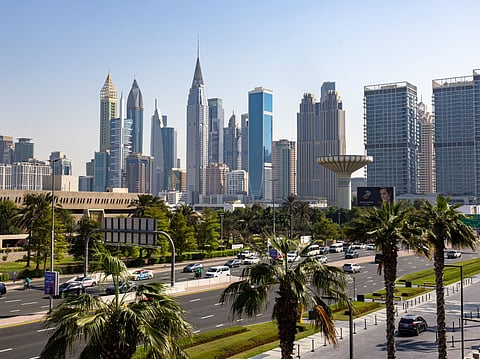Dubai defies global slowdown to become world’s strongest luxury hub, Visa report shows
Data shows Dubai standing out as the only major city where luxury spending stayed strong

Dubai: Luxury spending has cooled across major global cities for the first time since the financial crisis, yet Dubai has emerged as the world’s strongest-performing luxury destination, according to new data from Visa’s Global Economic Insight report. While London, Paris, New York and Singapore all saw a decline in the share of residents buying high-end goods in the first half of 2025, Dubai held steady, reinforcing its status as the most resilient luxury market worldwide.
The findings mark a sharp divergence in global consumer behaviour. Across leading capitals, uncertainty around trade, shifting currencies and a softer macro outlook led many affluent buyers to pause purchases. But Dubai’s luxury sector moved in the opposite direction, supported by a fast-growing base of high-earning households and a steady flow of international visitors.
Dubai’s luxury resilience stands out
Visa’s data shows that nearly one in nine Dubai residents made a luxury purchase each quarter this year, a rate far above other global hubs. The stability reflects the emirate’s unique consumer profile, with about 37% of households earning more than 150,000 dollars a year. Analysts say this structural advantage gives Dubai greater insulation from global slowdowns.
“The first half of 2025 showed that even the world’s most confident consumers are taking a pause. Yet the long-term outlook for luxury remains strong,” said Mohamed Bardastani, Visa’s Principal Economist for Central and Eastern Europe, Middle East and Africa. “The momentum we are seeing in Dubai underlines its position as a global luxury hub, supported by a strong base of affluent residents and steady tourism flows. As new consumers enter the market and wealth passes from one generation to the next, the base of luxury buyers will continue to grow.”
A shift in who buys luxury
The report also captures a broader evolution in luxury spending patterns. While elite buyers still drive a significant portion of high-end purchases, Visa’s analysis shows luxury spending is no longer the domain of the top 1% alone. The appeal now extends across affluent consumers in the top 5%, emerging affluent groups in the top 10% and even upper-middle-income households in the top 20%.
Analysts say the trend reflects a shift in what luxury represents. Beyond status symbols, high-end goods have become markers of personal achievement and self-expression, particularly for younger and globally mobile consumers. The pattern is especially visible in Dubai, where residents from diverse backgrounds often view luxury purchases as a lifestyle milestone.
A global cooling in contrast
Elsewhere, luxury is showing its first signs of fatigue in more than a decade. In New York, France, the United Kingdom and Singapore, Visa’s data shows the percentage of cardholders buying premium goods has fallen from last year. The slowdown follows several years of strong post-pandemic growth that were driven by pent-up demand, currency swings and a boom in international travel.
Economists point to several factors behind the latest pullback. Inflation remains higher than many consumers expected, borrowing costs have stayed elevated and currency volatility has created uncertainty around cross-border purchases. These pressures, while manageable for wealthy households, appear to have softened sentiment at the margins.
Dubai’s combined strengths
Dubai’s ability to buck the downturn stems from its demographic and economic structure. A large base of affluent residents supports year-round spending, while the city’s position as a global tourism and retail hub ensures steady inflows of high-spending travellers. Luxury brands have also expanded aggressively in the emirate, opening flagship stores, experiential boutiques and curated concept spaces that reinforce Dubai’s reputation as a global shopping destination.
Industry analysts say Dubai benefits from a unique combination of factors: high disposable incomes, a tax-free environment, a population comfortable with premium spending and a retail landscape that offers global brands at competitive prices. The city’s investment in major retail districts, luxury malls and experiential shopping formats has helped sustain demand even as global sentiment weakens.
A long-term shift in global luxury
The Visa report suggests the slowdown in other global cities may be temporary, with long-term fundamentals largely intact. Wealth creation continues to expand in Asia, the Middle East and parts of Europe, and generational wealth transfers are creating new luxury buyers around the world.
Dubai’s position at the centre of this shift is likely to strengthen. Analysts expect the emirate’s affluent population to grow further over the next decade, supported by new residency routes, expanding high-income sectors such as finance and technology, and a steady pipeline of international migrations into the UAE.
While global markets may be entering a phase of cautious luxury spending, Dubai has defied the slowdown with a level of resilience unmatched anywhere else.
Sign up for the Daily Briefing
Get the latest news and updates straight to your inbox



